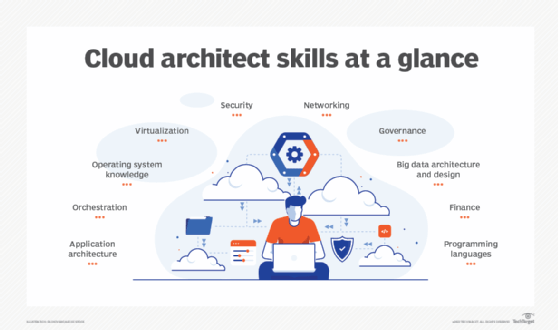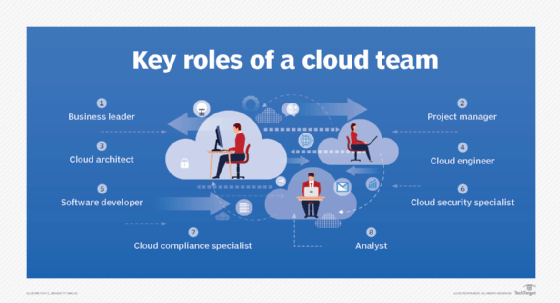
What is a cloud architect and how do you become one?
A cloud architect is an IT professional who is responsible for overseeing a company's cloud computing strategy. This includes cloud adoption plans, cloud application design, and cloud management and monitoring. Cloud architects oversee application architecture and deployment in cloud environments, including public cloud, private cloud and hybrid cloud. One of their primary objectives is to guarantee that the cloud infrastructure aligns with the business needs concerning scalability, performance, security and cost efficiency.
Additionally, cloud architects act as consultants to their organization and need to stay current on the latest trends and issues. Companies that hire cloud architects either use cloud services or are planning to move to the cloud.
Cloud architects can also be involved in the legal areas of cloud computing and can negotiate contracts and work with legal and procurement departments. Architects ensure service-level agreement requirements are met.
What are the job responsibilities of a cloud architect?
The main responsibilities of a cloud architect are to plan, design, execute and maintain all cloud environments in the organization. Other responsibilities include the following:
- Cloud adoption. If the company doesn't already use cloud infrastructure, the architect's role is to help determine the need for cloud and manage its adoption. Part of the process of cloud adoption is managing the cultural change in the organization that comes with changing infrastructure, employee roles and procedures. Another aspect of this is vendor management. The cloud architect should be able to communicate effectively with cloud providers and third parties that are involved in the program.
- Strategic design and planning. After cloud adoption is approved, a cloud architect should develop a cloud migration strategy that's carefully integrated with the business objectives of the company. This entails selecting the ideal combination of cloud service providers and services and creating infrastructures that develop to meet the expanding needs of the company. Cloud architects should also ensure that strong disaster recovery plans are in place in case of emergencies.
- Cloud architecture development. After strategic design and planning, the architect is tasked with developing the architecture, which spans several areas of IT, including application development, data management and identity and access management (IAM). It's the role of the architect to ensure that all these pieces work in harmony.
- Cloud management and monitoring. Once the architecture is established, the cloud architect's job is to maintain the architecture, provide troubleshooting and monitor its performance according to business objectives.
What skills does a cloud architect need?
Cloud architects require a combination of soft, or nontechnical skills, and technical skills to be successful.
The soft skills necessary for cloud architects include the following:
- Program leadership. They should be able to organize and plan programs around an organization's cloud deployment.
- Communication. Cloud architects should have good communication skills to be able to communicate complex technical concepts to team members and external vendors. Cloud architects work with a variety of stakeholders, including internal teams and external vendors to identify software requirements and ensure that architectural changes are coordinated across several domains. They also provide progress reports, establish targets and need to effectively communicate with both technical and nontechnical parties.
- Collaboration. They should be able to work effectively with other architecture team members and delegate responsibilities.
- Thought leadership. Cloud architects should be a change agent in their organization, suggesting ways to push the program forward.
- Change management. They should be adaptable and able to plan for and carry out changes in the program.
The hard skills necessary for a cloud architect include the following:
- Application architecture. Cloud architects should be able to coordinate different applications together in the cloud environment.
- Orchestration. They should use automation for the maintenance of certain areas of cloud infrastructure.
- Governance. Cloud architects should be able to handle benefits and risks when deploying key management points in cloud operations and set boundaries with competing organizational interests.
- Virtualization. Architects should be able to understand how to provision virtual machines (VMs) efficiently and integrate them with cloud technologies.
- Security. They should be able to design infrastructure with enterprise data security and IAM in mind. This will ensure that only authorized users can access applications.
- Operating system (OS) knowledge. Architects must understand the spectrum of OSes that exist in the complex enterprise cloud ecosystem. Examples include Windows, Solaris, Linux and Ubuntu.
- Networking. Cloud architects should understand the domain name system, TCP/IP and HTTP. They should also understand the infrastructure of main cloud providers such as Amazon Web Services (AWS), Google Cloud and Microsoft Azure.
- Programming languages. Many cloud architects have a significant software development background which often includes languages such as Java, Python or C#.
- Finance. Architects should understand the costs of different services and deployments and be able to balance those costs.
- Big data. They should understand big data architecture and design principles.
- Cloud security. Cloud architects tackle security issues associated with cloud computing. They oversee cloud activities and should be able to rectify vulnerabilities and offer guidance on managing high-risk scenarios.
- Technical expertise. Cloud architects should have extensive expertise in cloud architecture and platforms, including Amazon Elastic Compute Cloud, Azure Cloud and Google Cloud. They should be able to provide expert advice to development teams on infrastructure and assess the types of systems required to fulfill the organization's goals.
- Infrastructure as a code (IaC) mastery. Cloud architects should have a solid understanding and command of IaC, which is a method for managing and provisioning infrastructure resources using code and automation technologies. IaC lets cloud architects specify and deploy infrastructure components such as VMs, networks and cloud storage in a consistent and repeatable manner.
- Cost management. Cost management is an important skill for cloud architects, as they're responsible for designing and deploying cloud options that aren't only technically efficient but also cost-effective. To optimize the organization's cloud spending, cloud architects must consider the financial aspects of cloud services.

What qualifications and certifications does a cloud architect need?
Most cloud architect jobs require a bachelor's degree in an area such as computer science, cybersecurity, engineering or mathematics. Some companies prefer a master's degree. Along with education, cloud architects typically require on-the-job experience to gain practical knowledge and expertise in cloud computing. For example, starting in supporting roles such as DevOps or systems engineering can help aspiring cloud architects build a foundation in design and cloud architecture knowledge.

Additional certifications, both vendor-specific and vendor-neutral, are typically required for cloud engineer and cloud architect roles.
The following certification exams might be useful when pursuing a cloud architect career:
- AWS Certified Solutions Architect. This certifies the individual's ability to manage AWS applications and infrastructure, as well as knowledge of AWS cloud deployment and management services.
- Arcitura Certified Cloud Architect. This certification validates the skills used in cloud platform management and tests the individual's knowledge against real-world problems.
- ComptTIA Cloud+. This certification validates the skills and expertise of an individual in securely maintaining, deploying and using cloud technologies.
- Google Certified Professional Cloud Architect. Earning this certification shows the individual's ability to plan, design, manage and provision cloud architecture, and validates their knowledge of cloud security, compliance and architecture optimization. The exam tests the individual using real-world scenarios.
- IBM Cloud Advanced Architect v2. This certification is designed for professionals who have three or more years of experience working as cloud architects. It assesses a person's proficiency with IBM platforms, as well as their capacity to specify the parameters of a project and provide a tailored strategy on IBM Cloud.
- Microsoft Certified Azure Solutions Architect Expert. This certification validates the individual's skills, including designing cloud architecture, virtualization, security and business continuity using Microsoft Azure cloud platforms.
Which cloud platforms are used by a cloud architect?
When creating, optimizing and maintaining cloud-based applications, a cloud architect works with various platforms and cloud components.
Common elements that cloud architects use include the following:
- Front-end platforms. These are user interfaces or software that are used to access the cloud. Examples include web browsers, smartphone apps, application programming interfaces and authentication and authorization systems.
- Back-end platforms. This includes the hardware and software components of the cloud system, such as data storage, servers, VMs, hypervisors and network devices.
- Data delivery models. Cloud architects work with many data distribution models, including software as a service, infrastructure as a service (IaaS) and platform as a service. They create and execute strategies based on these models to fulfill the organization's needs.
- Virtualization. Cloud architects use virtualization technology to construct virtual servers, storage and networks, which also enables effective resource usage and scalability.
- Security mechanisms. Cloud architects deploy security measures to protect cloud resources and data. This includes access controls, encryption, identity and access management and other security protocols.
- Monitoring and management tools. Cloud architects work with monitoring and management tools to oversee and optimize cloud operations. These tools help in monitoring performance, resource utilization and ensuring high availability of resources.
- Disaster recovery. Cloud architects develop and design disaster recovery plans to maintain business continuity in the event of service outages or failures. This consists of backup and recovery procedures, data replication and failover settings.
- Networking infrastructure. Cloud architects create and configure the cloud's network architecture using networking components. This includes network connectivity, load balancing, firewalls and other network-related settings.
Cloud architect career path and salary expectations
According to Glassdoor, a cloud architect in the U.S. can expect to make $175,292 per year, with an average annual salary of $136,599, depending on education, location, skills, industry and years of experience. ZipRecruiter estimates for this position are a bit higher, with a cloud architect making an average of $147,236 annually.
In addition to the certifications noted above, prospective cloud architects can study the field in school to earn a degree to validate their skills. Existing IT professionals might be able to find job opportunities or transition into the role with the right skills. Different IT skill sets could also lend themselves to different cloud architect specializations. For example, a business savvy architect who possesses an understanding of IT trends could specialize in buying emerging cloud technologies. IT professionals with virtualization and IaaS experience might bring a specialized skill set to a larger, more encompassing cloud program. In addition, cloud architects with previous DevOps experience might find that their skills fit the job description.
Because cloud technology continually evolves, cloud architects are expected to keep up with the newest developments in tools, best practices and trends. Maintaining knowledge in the profession requires ongoing learning via workshops, industry events, certifications and online courses.
The growing demand for cloud professionals is fueled by the evolving digital landscape and the transformative advantages of cloud technology for businesses. Explore these essential skills that help individuals on their cloud career paths.






